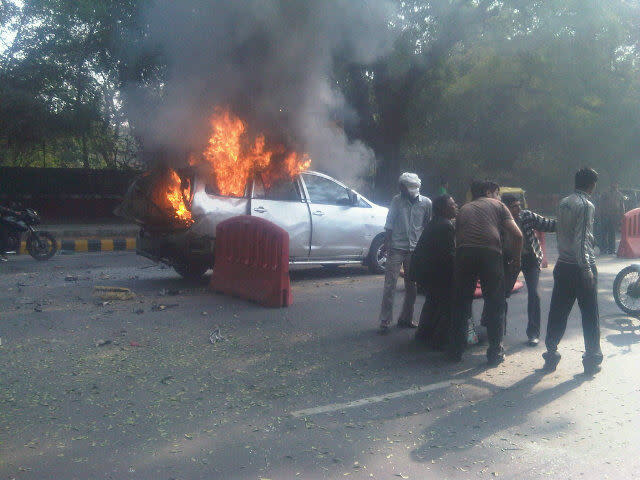 The Envoy
The EnvoyIsraeli diplomat wounded in India car bomb blast; second attack thwarted in Tbilisi
Israeli leaders blamed Iran and Lebanese Shiite militant group Hezbollah for a car bomb attack that wounded an Israeli diplomat at its New Delhi, India embassy Monday. A second car bomb targeting the vehicle of a non-diplomatic staffer at the Israeli embassy in Tbilisi, Georgia was defused Monday before it detonated, Israeli foreign ministry official Paul Hirschson told journalists.
"Iran, which is behind these attacks, is the biggest exporter of terrorism in the world," Israeli Prime Minister Benjamin Netanyahu said in a Facebook posting Monday, the Jerusalem Post reported. "The Israeli government and its security forces will continue to work together with local security services against these terrorist actions."
Iran's ambassador to India strongly denied any Iranian role in the attack, Reuters reported.
The photo below shows the scene near the exploded car in New Delhi, which was witnessed by New Delhi-based journalist Joji Philip Thomas and posted to Twitter. Thomas said the wounded person in the blast was female.

Israeli officials confirmed an Israeli diplomat in New Delhi was wounded in the attack, describing her injuries as "light to medium," and said that her driver had also been slightly injured.
"We can confirm there is one Israeli injured in New Delhi," an Israeli official told Yahoo News Monday. He said both incidents are being investigated, and described security cooperation with local security forces in India and Georgia as "very good."
The driver of the car targeted in Tbilisi--described as an Israeli non-diplomat--realized something was wrong with the car and called the authorities who neutralized the device and thwarted the plot, Israeli officials said Monday.
Israeli Foreign Minister Avigdor Lieberman, confirming the attacks on Israeli embassies abroad Monday, vowed that Israel would retaliate against those responsible for the acts of terrorism.
"This just means that the State of Israel and its citizens face a daily threat of terror, both physical and diplomatic," Lieberman said, according to Israeli newspaper Haaretz. "We know exactly who is responsible for the attack and who planned it and we're not going to take it lying down."
Secretary of State Hillary Clinton harshly condemned the attacks in a statement Monday. "The scourge of terrorism is an affront to the entire international community," she said, adding her thoughts and prayers are with the injured personnel and their loved ones.
Analysts noted the attacks come as Israel has been on an increased state of alert for possible revenge attacks on the fourth anniversary of the assassination of Hezbollah militant Imad Mugniyah. (Israel has not claimed responsibility for the killing of Muginyah, who was slain in a car bomb attack in Syria in February 2008.) They also come after a recent string of reportedly foiled plots targeting Israeli interests in Azerbaijan and Thailand. Iran has also blamed Israel's intelligence service the Mossad (as well as Britain's MI6 and the CIA) for the assassination of several Iranian nuclear scientists, including one killed in a car bomb attack in Tehran last month.
"Israel has been on high state of alert for a long time now, and always near the anniversary of Mugniyah's assassination," former FBI terrorism analyst Matthew Levitt told Yahoo News Monday. "These attacks come on the heels of foiled attacks [on Israeli embassies] in Azerbaijan believed to be tied to Iranian agents; and in Thailand by Hezbollah agents, one of whom was arrested."
"These attacks should not surprise in the least, because both Iran and Hezbollah have been trying to carry out attacks targeting Israel for some time now," he added.
Still, "it could have been much worse," Levitt, now with the Washington Institute for Near East Policy, continued, noting that one attack Monday was foiled and the other "barely succeeded."
The limited damage "gives Israel some leeway in how it retaliates," he said. "We are probably not going to see war or massive air strikes, maybe if there is some low hanging fruit."
As to how it affects Israel's wider push for more aggressive international action against Iran's nuclear program, Levitt said Israel and Iran view Monday's attacks as "part of the same. One reason Iran is now actively involved in these kind of attacks as opposed to just Hezbollah is that Iran sees a real shadow war underway. Iran sees its [nuclear] scientists assassinated. This shows Iran intends to retaliate for that."
Other popular Yahoo! News stories:
• US condemns car bomb attack on Iran nuclear scientist
• Senate resolution would rule out containing nuclear Iran
• Turkish envoy: The decision that inspired Obama's trust in Erdogan
Want more of our best national security stories? Visit The Envoy or connect with us on Facebook and on Twitter.

